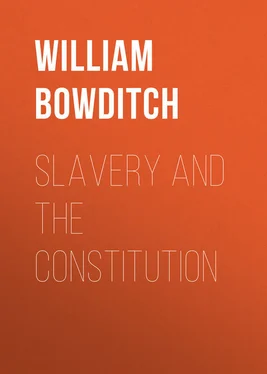William Bowditch - Slavery and the Constitution
Здесь есть возможность читать онлайн «William Bowditch - Slavery and the Constitution» — ознакомительный отрывок электронной книги совершенно бесплатно, а после прочтения отрывка купить полную версию. В некоторых случаях можно слушать аудио, скачать через торрент в формате fb2 и присутствует краткое содержание. ISBN: , Жанр: foreign_antique, foreign_prose, на английском языке. Описание произведения, (предисловие) а так же отзывы посетителей доступны на портале библиотеки ЛибКат.
- Название:Slavery and the Constitution
- Автор:
- Жанр:
- Год:неизвестен
- ISBN:http://www.gutenberg.org/ebooks/38716
- Рейтинг книги:4 / 5. Голосов: 1
-
Избранное:Добавить в избранное
- Отзывы:
-
Ваша оценка:
- 80
- 1
- 2
- 3
- 4
- 5
Slavery and the Constitution: краткое содержание, описание и аннотация
Предлагаем к чтению аннотацию, описание, краткое содержание или предисловие (зависит от того, что написал сам автор книги «Slavery and the Constitution»). Если вы не нашли необходимую информацию о книге — напишите в комментариях, мы постараемся отыскать её.
Slavery and the Constitution — читать онлайн ознакомительный отрывок
Ниже представлен текст книги, разбитый по страницам. Система сохранения места последней прочитанной страницы, позволяет с удобством читать онлайн бесплатно книгу «Slavery and the Constitution», без необходимости каждый раз заново искать на чём Вы остановились. Поставьте закладку, и сможете в любой момент перейти на страницу, на которой закончили чтение.
Интервал:
Закладка:
As a necessary result of his learning to read, Douglass loathed slavery, and detested his enslavers. If he had never read, his eyes would never have been fully opened to the extent of his wrongs; and what is true of him is true of all other slaves. Any slave who can read Sheridan's denunciations of slavery must, like Douglass, loathe his condition, and detest his oppressors.
But a slave who loathes his condition, and detests his oppressors, will be refractory and disobedient. A late writer in the "Charleston Mercury" admits this when he remarks ("William Jay's Letter to Bishop Ives," 1848, p. 12): —
"It has been the policy of this State not to admit the teaching to the slaves, either of reading or writing. We all know why this is so. It needed no great scope of argument to satisfy those who framed our laws, that the expansion of intellect, the hundred influences which education generates, would be very inconsistent with habits of obedience, which was the corner-stone of the institution."
Such a slave will also try to escape at every fair opportunity; and, being able to write passes or forge free papers, the chances for successful escape are very much increased. The owner's hold upon him becomes daily more and more precarious, and consequently the slave's value as property daily diminishes. So true is this, that in Louisiana a buyer may legally refuse to take a slave, if he has only "absented himself from his master's house twice for several days, or once for more than a month." The "Civil Code" (Art. 2496, 2505) declares that the "vice of character," as it is called, which is proved by either of these Acts, renders the slave absolutely useless, or renders his use so inconvenient or imperfect that it must be supposed no one would buy a slave who was known to have this vice.
Every particle of instruction given to a slave beyond what is consistent with his remaining a passive and obedient, working machine, is so much money taken from the master's pocket. Nobody wants to invest his money in a slave who is refractory or disobedient, or who runs away at every opportunity, – unless, indeed, he buys the stock, in consequence, at very much under par! The value of Douglass as a slave decreased just as fast as his manhood increased; and Capt. Price now candidly avows, that he hesitated some time before he invested seven hundred dollars in William W. Brown; for William was a noted runaway! The love of money impels the slaveholders to keep their slaves in ignorance.
Not only this, but an educated slave, who loathes his condition and hates his oppressors, is an unsafe member of a household or a community. His means for taking a fearful vengeance are ample, and what consideration shall stay his hands? None but an educated slave can plan or head an insurrection. Such are the ones who always do take active part in rebellions. The house-servants constitute everywhere the most educated class. None are more dreaded than they, for this reason in part, and partly because of their living under the same roof with their masters. In a pamphlet published in Charleston, S. C. in 1822, p. 14, by Gen. Thomas Pinckney, speaking of house-servants, he remarks: —
"They are the most dangerous. Their intimate acquaintance with all the circumstances relating to the interior of the dwellings, the confidence reposed in them, and the information they unavoidably obtain from hearing the conversation and observing the habitual transactions of their owners, afford them the most ample means for treacherous bloodshed and devastation . The success, therefore, of servile conspiracies mainly depends on this class for taking off, by midnight murder, their unsuspecting owners; and the late trials, by exhibiting so large a portion of this description among the ringleaders of the conspiracy, afford a melancholy proof of their promptitude to become actors in such scenes." — William Jay's Letter, &c. p. 9.
The love of life itself, the desire for the safety of their wives and children, impels the slaveholders to keep their slaves in ignorance.
Two of the strongest motives which can be brought to bear upon man, the love of money and the love of life, are therefore constantly urging the slaveholder to darken the minds of his slaves. If the former of these motives leads to the commission of so much wrong everywhere, what will not both motives together accomplish to the injury of the slave? But the slaveholders have not been willing to trust wholly to these motives, strong though they are. In many of the States, it is a penal offence to teach a slave to read or write; and, where laws of this kind do not exist, custom, as universal, powerful, and remorseless as the law, accomplishes the same wrong. The following are some of these laws: —
The "Revised Statutes" of North Carolina, chap. 34, sec. 74 ("Revision of Stat." 1830, chap. 6, § 1), provide that
"Any free person who shall hereafter teach, or attempt to teach, any slave within this State to read or write, the use of figures excepted, or shall give or sell to such slave or slaves any books or pamphlets, shall be liable to indictment in any court of record in this State having jurisdiction thereof; and, upon conviction, shall, at the discretion of the court, if a white man or woman, be fined not less than one hundred dollars, nor more than two hundred dollars, or imprisoned; and, if a free person of color, shall be fined, imprisoned, or whipped, at the discretion of the court, not exceeding thirty-nine lashes, nor less than twenty lashes."
Chap. 111, sec. 27 (Statute, 1830, chap. 6, § 2), provides that, —
"If any slave shall teach, or attempt to teach, any other slave to read or write, the use of figures excepted, he or she may be carried before any justice of the peace, and, on conviction thereof, shall be sentenced to receive thirty-nine lashes on his or her bare back."
In South Carolina, the "Negro Act" (1740, § 45; "2 Brev. Dig." 243), provides that —
"All and every person and persons whatsoever who shall hereafter teach, or cause any slave or slaves to be taught to write, or shall use or employ any slave as a scribe in any manner of writing whatsoever, hereafter taught to write; every such person and persons shall, for every such offence, forfeit the sum of one hundred pounds current money."
In Alabama (Statute, 1832, chap. 8, § 10; "Clay's Digest," p. 543, § 24), —
"Any person or persons who shall attempt to teach any free person of color, or slave, to spell, read, or write, shall, upon conviction thereof by indictment, be fined in a sum not less than two hundred and fifty dollars, nor more than five hundred dollars."
In Georgia ("Penal Code approved Dec. 23, 1833," 13th div., sec. 18; "Prince's Digest," p. 658; "William A. Hotchkiss's Codification," 1845, p. 772), —
"If any person shall teach any slave, negro, or free person of color, to read or write either written or printed characters, or shall procure, suffer, or permit a slave, negro, or person of color, to transact business for him in writing, such person so offending shall be guilty of a misdemeanor, and, on conviction, shall be punished by fine, or imprisonment in the common jail of the county, or both, at the discretion of the court."
In Mississippi ("Howard & Hutchinson's Laws," p. 673),
"No slave or free person of color can be employed in the setting of types in any printing office."
In Missouri, the "Revised Statutes" (chap. 8, sec. 10, p. 117) provide that, —
"When an apprentice is a negro or mulatto, it shall not be the duty of the master to cause such colored apprentice to be taught to read or write, or a knowledge of arithmetic; but he shall be allowed, at the expiration of his term of service, a sum of money in lieu of education, to be assessed by the county court."
The Act of 1847 (approved Feb. 16, § 1) reads, —
Читать дальшеИнтервал:
Закладка:
Похожие книги на «Slavery and the Constitution»
Представляем Вашему вниманию похожие книги на «Slavery and the Constitution» списком для выбора. Мы отобрали схожую по названию и смыслу литературу в надежде предоставить читателям больше вариантов отыскать новые, интересные, ещё непрочитанные произведения.
Обсуждение, отзывы о книге «Slavery and the Constitution» и просто собственные мнения читателей. Оставьте ваши комментарии, напишите, что Вы думаете о произведении, его смысле или главных героях. Укажите что конкретно понравилось, а что нет, и почему Вы так считаете.












